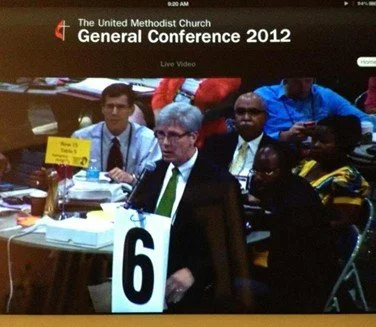Reading Luke/Acts Together #69 – Holy Conferencing
Read Acts chapter 15. Once upon a time, Methodist conferences were not consumed by business and budgets so much as they were by theology and mission strategy: what do we believe and teach? and how shall we reach people? We’re trying to get back to that lately!
The ability of Christians to gather, debate our doctrines, and still be the Body of Christ despite disagreement is impressive - and terribly misunderstood. Modern critics think they undermine Christianity by pointing out the diversity in the early Church - how there was not one single Christianity, but multiple and competing versions of the faith. Bart Ehrman (Lost Christianities), among others, has made a small fortune selling books touting what we have always known: faithful Christians have divergent understandings of the significance of Christ, how we make sense of the inner heart of God, and how to be God's people. No surprise! After all, we are talking about God, transcendent, ineffable, loving mystery, ancient but ever new, known and followed by fallible mortals.
Admittedly, in the early centuries of the Church, as Philip Jenkins has demonstrated (in Jesus Wars), theological debates were marked by bullying and occasional violence. But at least theology mattered! And frankly, we have a lovely model in how to talk theology and strategy in the book of Acts. There indeed were splits among the first Christians - and in Acts 15, we read that they had a big summit meeting to talk about it. Must converts heed the Jewish law or not? and other questions elicited heated debate. As we read Acts 15, the differences were great - but the participants yielded to the way God might surprise by doing some new thing, something beyond their comprehension, perhaps akin to what we see God doing today in the southern hemisphere.
In a way, they divided to conquer. Those insisting on a thoroughly Jewish Christianity could continue their work – which had been plenty successful! And those embracing the new way to reach Gentiles with the Gospel, and without the strictures of Jewish laws like circumcision and diet, could launch out into the world without recrimination – and that too had proven successful already.
When I was leading in the work to change our United Methodist laws around LGBTQ inclusion, I was asked to make the lead speech in the debate (see photo of younger me doing so above!). I cited Acts 15 as a Scripture example of how two groups with very different ideas about what to do about things like private body parts could agree to disagree and do their own work in their own mission fields. Our legislation, which basically said We disagree, was defeated, 52% to 48% - meaning, I suppose, we didn’t disagree? Christians need to stick with the utter, central essentials of the faith, like God and creation, Christ as God with us and our savior, the resurrection and grace, all God’s actions – and then let the faithful deliberate how we live that out in our various cultural settings and with our admittedly limited wisdom and unlimited need for mercy.
What is striking about those who disagreed in Acts 15 is their respect for others, and thus their eagerness to learn: the Greek word used for their argument was the same as "dialogue," and verse 12 reports that they kept silence and listened. Can Christians today listen? and learn? and wonder what new thing God might do? while exploring ever more deeply what is ancient and perennially true? Should we dispense with Roberts' Rules of Order, which gives the advantage to the clever, and it's all or nothing, winner-take-all? In Acts 15, there were no losers. The winners were the not-yet-converted who were gifted by a passionate, mature Church that could disagree without being disagreeable, who knew that reaching people for Christ trumped being "right."
Methodists talk a lot about “holy conferencing,” although our real conferences haven’t always been so holy. Can all Christian bodies, at the local or denominational level, be silent and listen? and care about what we believe and teach? and place mission above personal bias or preference?
